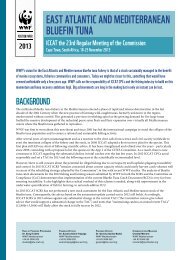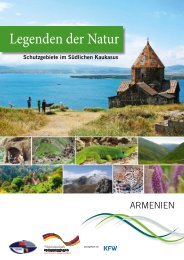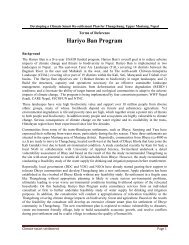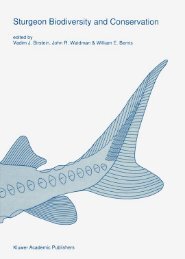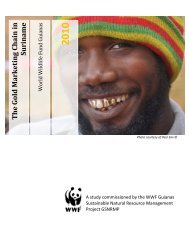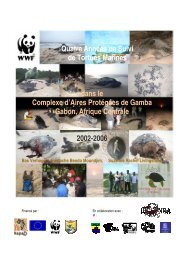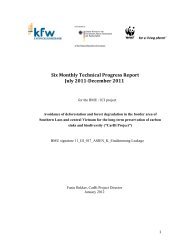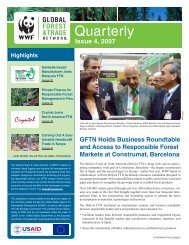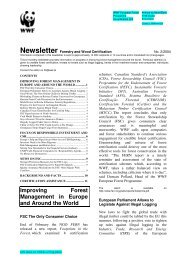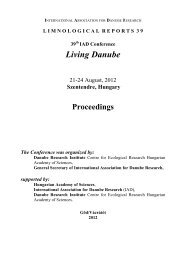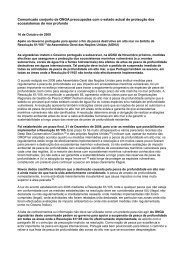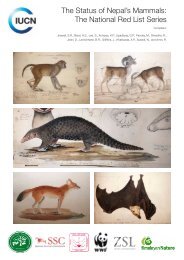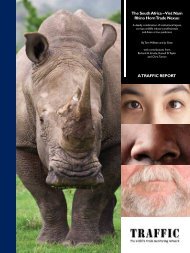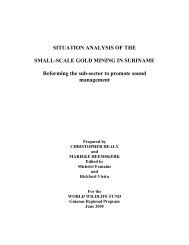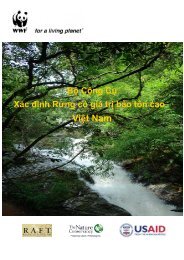The truth behind APP's greenwash - Pemerintah Kota Jambi
The truth behind APP's greenwash - Pemerintah Kota Jambi
The truth behind APP's greenwash - Pemerintah Kota Jambi
You also want an ePaper? Increase the reach of your titles
YUMPU automatically turns print PDFs into web optimized ePapers that Google loves.
1. Background<br />
In 1984, the Sinar Mas Group’s Asia Pulp & Paper (SMG/APP), headquartered in Shanghai,<br />
China, started to operate its first pulp mill in Riau Province in Sumatra 1 . <strong>The</strong> mill, Indah Kiat<br />
Pulp & Paper, was Indonesia’s first ‘mega pulp mill’ with a 105,000 tons-per-year production<br />
capacity. In 1994, APP opened its second pulp mill, Lontar Papyrus Pulp & Paper Industry, in<br />
neighboring <strong>Jambi</strong> Province. Both mills exclusively pulped mixed tropical hardwood<br />
(MTH) from clearance of natural forests. Both mills continued to expand.<br />
That is why since 1999, customers, creditors, scientists, and civil society have been calling<br />
2, 3, 4, 5, 6, 7<br />
on SMG/APP to not use wood from natural forests to produce its pulp and paper<br />
and implement two main policies:<br />
1. Operation according to the Forest Stewardship Council’s “Principle 9. Maintenance of High<br />
Conservation Value Forests (HCVFs) defined as environmental and social values that are<br />
considered to be of outstanding significance or critical importance 8 ” 1 .<br />
2. No expansion of pulp production capacities or building of new pulp mills until sufficient<br />
responsible and sustainable plantations have been established in already-deforested<br />
areas.<br />
SMG/APP has refused to commit to these requests and is continuing to expand its<br />
pulp capacity, to pulp natural tropical forests, and to drain peat soils as documented<br />
in detail by Eyes on the Forest and many other organizations. By 2010, SMG/APP’s total pulp<br />
production capacity in Sumatra had grown to at least 2.7 million tons per year. In addition,<br />
SMG/APP had added an additional 1 million ton per year pulp mill in China in 2005 9 .<br />
SMG/APP does not have a sufficient plantation supply to feed any of its mills, but is<br />
planning to build at least two new pulp mills in Indonesia soon.<br />
While SMG/APP has been operating in Riau and <strong>Jambi</strong> provinces, the provinces’ and<br />
Sumatra’s natural forest cover has shrunk to less than 30% of the island’s land mass; the<br />
island’s tigers, elephants and orangutans have come ever closer to extinction through<br />
intensifying human-wildlife conflicts and poaching pressure brought about by their<br />
increasing loss of natural forest habitat; and more and more deep peatlands have been<br />
drained, emitting the carbon stocks they had stored over thousands of years 10 . With<br />
Sumatra’s accessible natural forest almost finished APP has now begun targeting the natural<br />
forests and peatlands of Kalimantan and Papua.<br />
<strong>The</strong> devastation caused by the Sinar Mas Group’s paper company has led to intense global<br />
critique by civil society and customers. SMG/APP’s response has been classic, it continued<br />
business as usual but put vast resources into a global green-washing campaign - financed by<br />
the deforestation of Sumatra.<br />
In 2006, SMG/APP published a full page advertisement “APP’s Commitment: Conservation<br />
Beyond Compliance” in the New York and London Times – its first big global PR action –<br />
falsely portraying itself as a responsible forest and wildlife protection company. A WWF<br />
Indonesia point by point rebuttal detailed the company’s misstatements 11 .<br />
Today, five years later, APP continues repeating the same false statements together with<br />
some new twists, all trying to hide the ultimate foundation of the Sinar Mas Group/APP’s<br />
operations: the continuing destruction of natural tropical forest and drainage of peat soils.<br />
APP’s PR effort today is bigger and with more aggressive use of the media than ever before.<br />
APP has recruited a wide variety of publicists, individuals and supposedly independent NGOs<br />
to flack its allegedly green practices, including, Cohn & Wolfe 12 , Environmental Resource<br />
Management 13 , Alan Oxley and his World Growth and ITS Global 14, 15, 16 , Mazars 17 , Carbon<br />
Conservation 18 , Patrick Moore and his Greenspirit Strategies 19 , Bastoni and his Sumatran<br />
1 In practice, this is to commission prior to any clearing of natural forest an independent and transparent<br />
assessment with the “HCVF Toolkit for Indonesia 1 ” to identify High Conservation Value Forests, and to<br />
protect and maintain all of them.<br />
1



